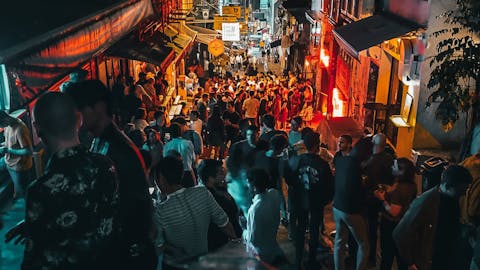In this article, we will take a look at the 25 most racist states in America ranked by hate crimes.
Racism is an outcome arising from the intricate interplay of individual beliefs, societal values, and institutional procedures. It can manifest through various expressions, including actions of individuals and institutions, taking on multiple forms. Racism can be composed of humor or comments that may inadvertently cause offense or harm, name-calling or verbal insults, harassment or threats, as well as media or online content that fuels hostility towards specific groups. In its most extreme manifestations, racism can lead to physical abuse and violence.
Racial disparities are evident across various systems, encompassing education, employment, housing, transportation, environmental issues, economic development, social services, the criminal justice system, and political representation. Furthermore, these disparities manifest in both subtle and overt ways, ranging from implicit biases to explicit discrimination. In recent years, the Black Lives Matter movement and protests against police brutality have galvanized efforts to address structural racism and promote anti-racist policies and practices.
As per data from the National Center for Education Statistics in 2020, degree-granting postsecondary institutions reported the three most prevalent types of on-campus hate crimes, which were intimidation, vandalism, and simple assault. The data also indicated that the leading categories of bias motivating these hate crimes were race, sexual orientation, and ethnicity. Specifically, race served as the motivating bias in 55% of the reported hate crimes with 314 incidents, while sexual orientation accounted for 16% of reported hate crimes with 90 incidents, and ethnicity was the motivating bias in 11% of the reported hate crimes with 65 incidents.
Measuring racism presents a notable challenge, as conventional survey methods often fall short. When people are directly questioned about their racial biases, they tend to deny them. This is partly because much of today’s racism operates at the subconscious level or finds expression through anonymous online interactions. While individuals conducting Google searches are typically online and often alone, conditions that facilitate the expression of thoughts are considered socially taboo. Importantly, Google’s search data demonstrates a robust correlation with other established measures that social science researchers traditionally employ to examine racist attitudes. To address the issue regarding traditional survey methods, the researchers in the PLOS ONE paper adopted an alternative approach by examining searches containing the N-word. Strikingly, this offensive term is frequently searched for, occurring at a rate similar to searches for terms like “migraine,” “economist,” “sweater,” and the like.
In 2020, hate crimes were motivated by various factors, with 15% categorized as Afrophobic, 1% as antiziganist, 1% targeting the Sami community, and 37% falling under the broader category of xenophobic and racist crimes. This latter category encompassed both general and unspecified xenophobic and racist motives, along with hate crimes directed at specific ethnicities and nationalities that were too infrequent to be separately reported. These statistics unveil a multifaceted and diverse landscape of hate crimes. Xenophobic and racist hate crimes took various forms, including harassment, threats, and acts of violence, occurring in both public and private settings, as well as digital environments. They targeted both men and women, as well as entities rather than natural persons. Perpetrators ranged from unknown individuals to acquaintances, colleagues, and neighbors. Among the identified Afrophobic hate crimes, assault was more prevalent compared to other xenophobic and racist hate crimes, and defamation occurred more frequently. On the other hand, antiziganist hate crimes were characterized by unlawful discrimination, victimization by service personnel, and incidents of violence, threats, and harassment in public spaces and victims’ homes, distinguishing them from other hate crimes.
In America, initial data gathered from over thirty U.S. police departments reveals a significant increase in hate crimes in 2021, with this upward trend continuing into 2022. A substantial portion of this surge is attributed to incidents targeting Asian and Jewish Americans. On average, incidents driven by bias in 37 major U.S. cities witnessed an uptick of nearly 39%. The ten largest metropolitan areas, in particular, experienced a record-breaking increase of 54.5%. These statistics are based on an analysis of national police data compiled by the Center for the Study of Hate and Extremism at California State University, San Bernardino.
The majority of reported hate crimes occurred in various settings, with the most common being public places at 20%, followed closely by incidents at or near the victim’s residence at 19%, and occurrences at the victim’s workplace, constituting 11%. Hate crimes conducted in digital spaces were also notable, with 9% taking place through channels like chat, text messages, and phone interactions, while social media accounted for 6%, and other online platforms made up 2%, totaling 17% of reported hate crimes. Additionally, 10% of these offenses were reported to have transpired within a school environment, whether physical or digital. Regarding the victims themselves, males accounted for 38% of the cases, while females represented 27%. In 28% of the reports, no crime was directed towards an individual.
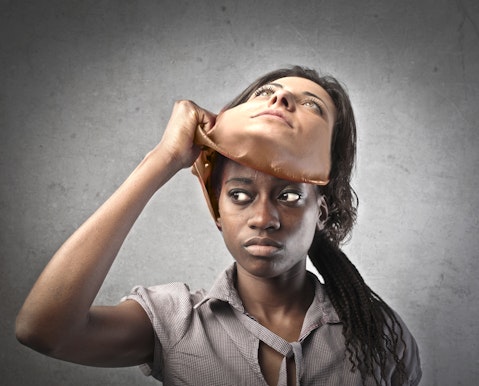
Ollyy/Shutterstock.com
Our Methodology
Assessing the most racist cities in the USA isn’t as straightforward as measuring population or land area. While polls and surveys can be employed for this purpose, their accuracy can vary. Alternatively, data related to hate crimes and hate speech incidents can be employed to gauge the extent of racism in different areas. To create our list of the 25 cities in America with the highest levels of racism, we conducted thorough research, using the most up-to-date data on hate crime incidents in the United States, ranking states based on their reported hate crime rates. From there, we pinpointed the top 25 cities with the highest number of hate crimes. Through this approach, we successfully identified the 25 cities with the most significant issues related to racism in America. You can also take a look at the 30 Least Racist Countries in the World and 15 Most Racist States in America Ranked By Hate Crimes in 2017 to see how the rankings have changed.
25 Most Racist States in America Ranked by Hate Crimes
25. Iowa
Number of Racial Hate Crime Offenses: 117
Iowa landed in the 25th spot in our list of the most racist states in America ranked by hate crimes. Iowa boasts a population that is predominantly white, accounting for 90% of its residents. Despite changes in its regulations, racial bias against non-white individuals continues to persist. A report from 2016 uncovered that Iowa holds the distinction of having the most pronounced racial disparity in its prison population.
24. Wisconsin
Number of Racial Hate Crime Offenses: 118
Wisconsin has long been characterized as a predominantly white and working-class state. Historically, this perception held true, with the state’s population being 81% white. However, Wisconsin is undergoing rapid demographic changes. Census data from 1980 reveals that only three of its cities had Black populations exceeding 1%, and just two had Asian American populations exceeding 1%. Additionally, eight of these small Wisconsin cities had Latino populations of 1% or more. Fast forward to 2010, a substantial majority of these cities were no longer predominantly white. Nine of them had Black populations exceeding 5%, while 11 had Asian populations exceeding 5%. Remarkably, 19 out of the 35 small cities had Latino populations surpassing 5%.
23. South Carolina
Number of Racial Hate Crime Offenses: 122
Ranking 23rd in our list of the most racist states in America ranked by hate crimes is South Carolina. The region we now know as South Carolina was inhabited by Native peoples for millennia prior to the arrival of European settlers in the late 17th century. While their population experienced a significant decline following European contact, there are still several thousand Native Americans residing in the state today. Approximately two-thirds of South Carolina’s population consists of individuals of white European descent. During the state’s colonial period, its population was a diverse blend of various European peoples.
22. Virginia
Number of Racial Hate Crime Offenses: 125
White Europeans make up nearly three-fourths of Virginia’s population. African Americans, comprising about one-fifth of the population, serve as a significant reminder of the pivotal role enslaved African individuals and their descendants played in the state’s early development. Native Americans constitute only a small fraction of Virginia’s population. Since the late 20th century, the state’s Hispanic community has been experiencing rapid growth.
21. Utah
Number of Racial Hate Crime Offenses: 132
The state of Utah comprises individuals of European descent, with a predominant focus on Northern European heritage. While the majority of the population falls into this category, there are also smaller segments representing Asian, Hispanic, Native American, and African-American ancestries. Notably, during the latter part of the 20th century, there was a notable uptick in the presence of Hawaiians and other Pacific Islanders. Many of these newcomers had embraced the Mormon faith and subsequently migrated to Salt Lake City.
20. Kansas
Number of Racial Hate Crime Offenses: 146
Kansas ranks 20th in our list of the most racist states in America ranked by hate crimes. Black students in the suburbs of Kansas City often find themselves grappling with racist bullying as a recurring challenge in their educational experience. The frequency of racist incidents hasn’t necessarily increased, rather, they are gaining greater attention and publicity.
19. Louisiana
Number of Racial Hate Crime Offenses: 157
The initial European settlers in Louisiana were predominantly of French or Spanish origin. It was only later that “les Américains” established their presence in the northern region of the state. As of 2021, the demographic composition of Louisiana had evolved, with 31.2% of its residents identifying as Black or African American. A further 57.9% of the population were of white descent, while 6.7% were identified as belonging to two or more racial backgrounds.
18. Pennsylvania
Number of Racial Hate Crime Offenses: 161
According to the U.S. Department of Justice, 71.8% of the hate crimes committed in Pennsylvania in 2021 fall into the race and ethnicity bias motivation category. This equates to 117 racial crimes committed in that year alone. These compares to 62 racial crimes in 2020 and 28 in 2019.
17. Tennessee
Number of Racial Hate Crime Offenses: 163
Tennessee secures the 17th spot in our list of the most racist states in America ranked by hate crimes. Tennessee’s population is predominantly comprised of individuals of white European heritage, with African Americans representing a substantial minority. Smaller segments of the population include those of Asian, Hispanic, and Native American backgrounds. In 2021, the state witnessed 91 reported cases of hate crimes, accounting for 61.9% of the total reported crimes.
16. Indiana
Number of Racial Hate Crime Offenses: 165
Until 2019, Indiana was one of five states in America without a hate crime law aimed at safeguarding communities from hate and bias-motivated offenses. In 2021, Indiana reported 87 incidents of hate crimes, marking a decrease from the 124 cases documented in 2020.
15. Kentucky
Number of Racial Hate Crime Offenses: 178
Ranking 15th in our list of the most racist states in America ranked by hate crimes is Kentucky. The state reported 130 racial crime incidents in 2021, marking the lowest figure in the past ten years. The highest number of reported incidents within the past decade occurred in 2017, with a total of 380 cases. Over the last decade, anti-Black hate crimes were the most frequently reported in Kentucky for seven out of ten years.
14. Missouri
Number of Racial Hate Crime Offenses: 238
Missouri ranks 14th in our list of the most racist states in America ranked by hate crimes. In 2021, Missouri’s law enforcement agencies reported 194 hate crimes to the FBI, which exceeded the state’s previous record of 167 hate crimes reported in 1993. Among these incidents, over half were driven by racial bias.
13. New Jersey
Number of Racial Hate Crime Offenses: 241
The initial tally of bias incidents reported in 2021 marks a 29% surge compared to those reported in 2020. While New Jersey has been at the forefront of nationwide efforts to address and combat prejudice and hate, the record-high number of reported bias incidents in the latest available data serves as a reminder that there is still significant work ahead.
12. Alabama
Number of Racial Hate Crime Offenses: 263
Alabama ranks 12th in our list of the most racist states in America ranked by hate crimes. In 1901, Alabama’s state constitution was crafted by 155 white men with the explicit aim of “establishing white supremacy in this state.” This document has been a subject of contentious debate throughout its history. However, in a significant development last year, the state legislature unanimously voted to remove the racist language that still lingered within the constitution.
11. Nevada
Number of Racial Hate Crime Offenses: 265
The predominant ethnic background among Nevadans is of European descent, with over four-fifths of them being native-born Americans. A minority of residents in Nevada can trace their ancestry back to Basques who were recruited from their Pyrenean homeland to work as sheepherders. In Nevada in the year 2020, Hispanics comprised 29.5% of the total population, whites made up 47.4%, blacks accounted for 9.4%, American Indians constituted 0.8%, and Asians represented 9.2%.
10. Georgia
Number of Racial Hate Crime Offenses: 287
Georgia secures the 10th spot in our list of the most racist states in America ranked by hate crimes. In the early 21st century, Georgia had become one of the most populous states in the nation. The majority of its population was of European ancestry, comprising approximately two-thirds, while nearly one-third of the population identified as African American. A smaller percentage of the state’s residents had Asian, Hispanic, or Native American backgrounds. Georgia was also ranked among the 20 Most Crowded States in USA.
9. Minnesota
Number of Racial Hate Crime Offenses: 301
Ranking 9th in our list of the most racist states in America ranked by hate crimes is Minnesota. A study conducted in Minnesota examined disparities between black and white residents in various aspects such as unemployment, income, and homeownership. The study revealed that black individuals in Minnesota are ten times more likely to be jailed than their white counterparts. Additionally, it found that the median income for black households stands at $30,306, while white households have a significantly higher median income of $66,979. Experts in race relations believe that these two statistics are closely interrelated.
8. Oregon
Number of Racial Hate Crime Offenses: 315
The roots of racism in Oregon can be traced back to a period even before it achieved statehood in the United States. In 1859, Oregon distinguished itself as the sole state to join the Union with a black exclusion law, despite several other states, particularly in the Midwest, having attempted similar measures.
7. North Carolina
Number of Racial Hate Crime Offenses: 358
Racism remains prevalent throughout the country, and North Carolina is no different in this regard. The Southern Poverty Law Center (SPLC) has identified a total of 939 active hate groups in the United States, with 33 of them operating within the state of North Carolina.
6. Colorado
Number of Racial Hate Crime Offenses: 375
Colorado was able to secure the 6th spot in our list of the most racist states in America ranked by hate crimes. Systemic racism continues to endure within numerous policies and practices, leading to ongoing repercussions for Black Coloradans. Across various aspects such as health, education, housing, and early childhood, Black children and families in Colorado encounter concerning disparities. Disturbingly, racial minorities find themselves disproportionately represented among the unhoused population in Colorado. In 2020, despite comprising only 5.3% of the population, Black Coloradans accounted for 23.5% of Metro Denver’s unhoused population, as reported by the Colorado Coalition for the Homeless.
5. Michigan
Number of Racial Hate Crime Offenses: 486
Ranking 5th in our list of the most racist states in America ranked by hate crimes is Michigan. In August 2020, Michigan’s governor signed Executive Directive 2020-9, officially acknowledging racism as a public health crisis. The governor also tasked the Michigan Department of Health and Human Services (MDHHS) with prioritizing health equity as a central objective. Subsequently, close to 20 municipalities within Michigan have adopted similar resolutions of their own.
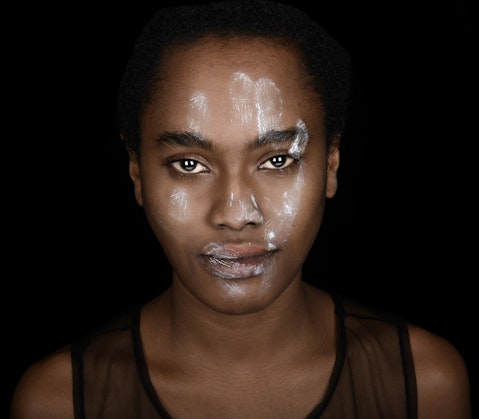
Laurin Rinder/Shutterstock.com
4. Massachusetts
Number of Racial Hate Crime Offenses: 489
Massachusetts is frequently celebrated as the birthplace of the abolition movement and one of the earliest states to abolish slavery. However, it’s worth noting that the Commonwealth’s economic development was intertwined with states that practiced slavery and considered people as property. Black and brown individuals hailing from outside Massachusetts as well as across the nation, assert that the state indeed merits its reputation for racism. Contrarily, the opposing group comprises white people of the state who either deny specific incidents as racist or, even more troublingly, refute the existence of racism in Massachusetts altogether.
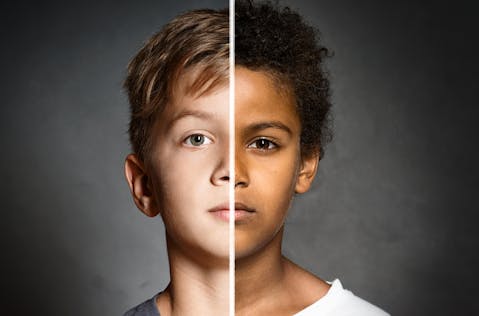
lassedesignen/Shutterstock.com
3. Ohio
Number of Racial Hate Crime Offenses: 569
Ohio ranks 3rd in our list of the most racist states in America ranked by hate crimes. Ohio is actively addressing the issue of racism and its impact on public health. In 2014, the state initiated CelebrateOne, a program aimed at reducing infant mortality in Columbus, with a particular focus on minority neighborhoods where this problem is more pronounced. Furthermore, local hospitals in the area are also taking steps to confront racism. The Ohio State Medical Center, for instance, has been running anti-racism initiatives for several years, with an increased commitment to these efforts following the George Floyd protests.
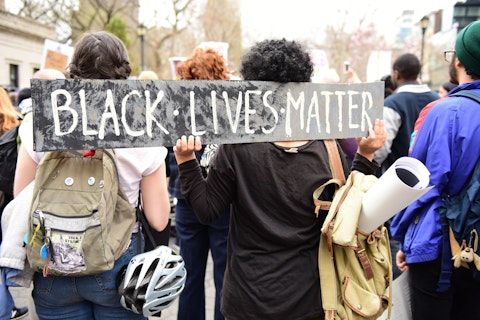
a katz/Shutterstock.com
2. Texas
Number of Racial Hate Crime Offenses: 642
Texas boasts the largest population of Black Americans among all states, with over 3.8 million individuals, constituting roughly 13% of the state’s total population. The state’s origins trace back to white men who were resolute in their quest to extend slavery westward, a contentious issue that ultimately ignited the Civil War. Texas holds the distinction of being the birthplace of Juneteenth, a holiday that commemorates the emancipation of enslaved people. Additionally, Texas often serves as a political bellwether in a nation marked by a lengthy history of racism, discrimination, and oppression. Despite these historical milestones, Black Texans are voicing their frustrations regarding uneven progress, limitations on discussing racism in public schools, as well as constraints on their political representation and access to voting.
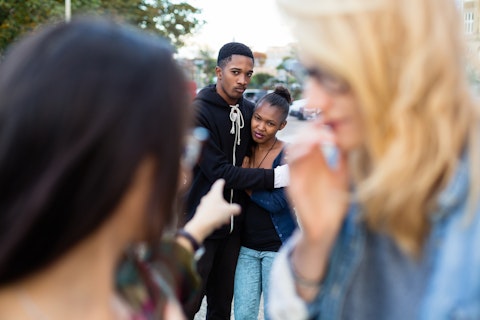
Kzenon/Shutterstock.com
1. Washington D.C.
Number of Racial Hate Crime Offenses: 698
Topping our list of the most racist states in America ranked by hate crimes is Washington D.C. But before we proceed further, we have a disclaimer. Washington, D.C., persists as a territory rather than a state, and since 1974, it has been under the governance of a locally elected mayor and city council, with Congress retaining the authority to exercise veto power. We included Washington D.C. in our list because it contains characteristics that qualify it to be a state. Furthermore, Washington D.C., the capital of the United States, also houses over 700,000 residents, surpassing the populations of Wyoming or Vermont. It also pays more federal taxes per capita than any state. But despite these, Washington, D.C., lacks statehood, resulting in, among other things, a lack of representation and voting rights in Congress.
Many people express deep concern over the significant increase in reported hate crime incidents in Washington D.C. According to recent data, Washington D.C. documented 698 hate crimes in 2021, reflecting over a 30% surge from the incidents reported in 2020. This represents the highest recorded number of hate crimes in the state since at least the year 2000.
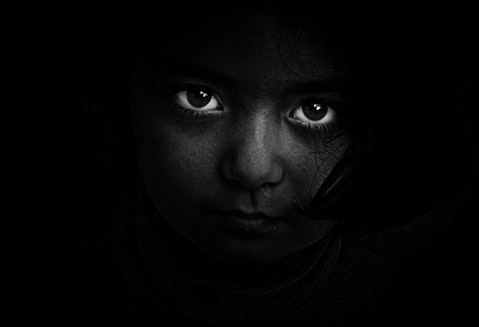
Suggested articles:
- 25 Dumbest Cities in America
- 25 Least Hygienic Countries in the World
- 20 Saddest Cities in the World
Disclosure: None. 25 Most Racist States in America Ranked by Hate Crimes is originally published on Insider Monkey.





